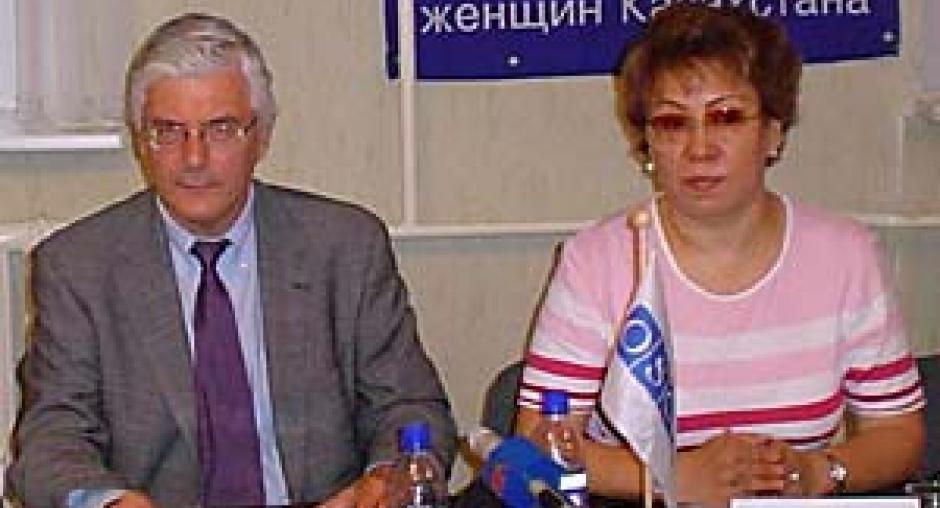Newsroom
OSCE Centre supports setting up a Resource Centre for repatriate women in Kazakhstan
ALMATY 29 July 2004

(OSCE)Ambassador Ivar Vikki, Head of the OSCE Centre in Almaty, and Raushan Sarsenbayeva, president of Kazakhstan Business Women Association, launched a one-year project for Kazakh returnee women, Almaty, 29 July 2004. (OSCE) Photo details
ALMATY, 29 July 2004 - The OSCE Centre in Almaty and the Association of Business Women of Kazakhstan today launched a one-year project to set up a resource centre for Kazakh returnee women in Almaty to provide social services making it easier to adapt to the new living conditions.
The Government of Kazakhstan allocates yearly quotas for thousands of what are known as oralmans - Kazakh repatriates - to return to their historic homeland. Within these quotas, returnees are provided with primary social assistance. As practice has shown, on immigrating to Kazakhstan, repatriates are in vital need of information on the country's social security provisions, educational system, entrepreneurship conditions and taxation regime.
"Oralmans need practical information given in a comprehensive form," said Raushan Sarsenbayeva, president of the Association of Business Women of Kazakhstan during the presentation of the project.
"Our tutor-guides will help them in seeking employment or starting their own business, in practical questions at the working place, as well as help them to adapt to the Kazakhstani society and learn the Russian language, which is still commonly used in public offices."
The Resource Centre will familiarize Oralmans with the customs of the country, inform them on their rights and duties as Kazakhstani citizens, and provide with necessary legal consultations. In addition to this, training seminars on entrepreneurship will be organized.
The Head of the OSCE Centre in Almaty, Ambassador Ivar Vikki, said the work on the Oralmans issue is better to be carried out on a regular and sustainable basis.
"It might be good to include them in the basic social state services," he said.
Co-operation with the Association of Business Women of Kazakhstan is a continuation of the OSCE Centre's activities in 2003 on training Oralman women on the basics of entrepreneurship. That has resulted in many businesses being started by many Oralman women.
The Government of Kazakhstan allocates yearly quotas for thousands of what are known as oralmans - Kazakh repatriates - to return to their historic homeland. Within these quotas, returnees are provided with primary social assistance. As practice has shown, on immigrating to Kazakhstan, repatriates are in vital need of information on the country's social security provisions, educational system, entrepreneurship conditions and taxation regime.
"Oralmans need practical information given in a comprehensive form," said Raushan Sarsenbayeva, president of the Association of Business Women of Kazakhstan during the presentation of the project.
"Our tutor-guides will help them in seeking employment or starting their own business, in practical questions at the working place, as well as help them to adapt to the Kazakhstani society and learn the Russian language, which is still commonly used in public offices."
The Resource Centre will familiarize Oralmans with the customs of the country, inform them on their rights and duties as Kazakhstani citizens, and provide with necessary legal consultations. In addition to this, training seminars on entrepreneurship will be organized.
The Head of the OSCE Centre in Almaty, Ambassador Ivar Vikki, said the work on the Oralmans issue is better to be carried out on a regular and sustainable basis.
"It might be good to include them in the basic social state services," he said.
Co-operation with the Association of Business Women of Kazakhstan is a continuation of the OSCE Centre's activities in 2003 on training Oralman women on the basics of entrepreneurship. That has resulted in many businesses being started by many Oralman women.
